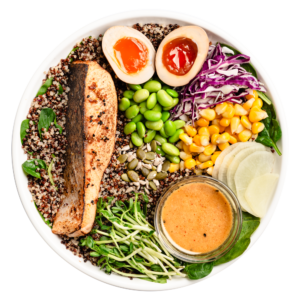Inflammation is the body’s natural defense mechanism against injury, infection, or harmful stimuli. However, when inflammation becomes chronic, it can lead to serious health issues such as heart disease, diabetes, arthritis, and even cancer. To combat chronic inflammation, one of the most effective strategies is adopting an anti-inflammatory diet, which emphasizes foods that reduce inflammation while avoiding those that may trigger it.
But what exactly does an anti-inflammatory diet look like, and how can you incorporate these principles into your daily meals? Let’s explore the key components of this diet and see how SaladStop!’s signature salads and warm protein bowls can be a convenient, delicious addition to your anti-inflammatory routine.
Key Components of an Anti-Inflammatory Diet
1. Fruits and Vegetables: Nature’s Powerhouses
- Berries (Blueberries, Strawberries, Raspberries): Berries are packed with antioxidants, especially anthocyanins, which have strong anti-inflammatory effects. These compounds help neutralize free radicals and reduce oxidative stress in the body, lowering the risk of chronic inflammation.
- Leafy Greens (Spinach, Kale, Swiss Chard): Rich in vitamins A, C, and K, and loaded with antioxidants, leafy greens are essential for fighting inflammation. They help detoxify the body, supporting your immune system while reducing levels of inflammatory markers.
- Cruciferous Vegetables (Broccoli, Brussels Sprouts, Cauliflower): These vegetables contain sulforaphane, a compound that has been shown to reduce inflammation and protect against various chronic diseases.
SaladStop! makes it easy to include these anti-inflammatory foods in your diet. For example, the Iron ‘Wo’ Man signature salad is packed with nutrient-dense baby spinach, roasted pumpkin, baked mushroom, and toasted almonds, all of which help fight inflammation naturally. The addition of feta, pomegranate seeds, raisins, and a spiced berry vinaigrette not only enhances the flavor but also adds a boost of antioxidants to keep inflammation at bay.
2. Healthy Fats: Omega-3s to Combat Inflammation
- Fatty Fish (Salmon, Mackerel, Sardines): Fatty fish are rich in omega-3 fatty acids, which are known to reduce inflammation. Omega-3s decrease the production of inflammatory molecules, such as cytokines and eicosanoids, helping to lower the risk of chronic diseases.
- Nuts and Seeds (Walnuts, Flaxseeds, Chia Seeds): These are excellent plant-based sources of omega-3s and are also high in fiber and antioxidants. Regular consumption of nuts and seeds has been linked to lower levels of inflammatory markers in the blood.
3. Whole Grains: The Importance of Fiber
- Oats, Quinoa, Brown Rice: Whole grains are high in fiber, which not only supports gut health but also reduces inflammation by promoting the growth of beneficial bacteria in the gut. These grains help stabilize blood sugar levels, preventing spikes that can trigger inflammation.
The Seoul-ful warm protein bowl from SaladStop! is excellent for an anti-inflammatory diet. Its organic quinoa provides fiber to support gut health, while seared tuna offers omega-3s to reduce inflammation. Paired with mushrooms, tofu, a soft-boiled egg, and radish pickles, it’s a flavorful, inflammation-fighting meal with sesame seeds and Yuja Vinaigrette.
4. Spices and Herbs: Flavor with Benefits
- Turmeric: This bright yellow spice contains curcumin, a powerful anti-inflammatory compound. Curcumin has been studied for its potential to alleviate symptoms of arthritis, depression, and other inflammatory conditions.
- Ginger: rich in gingerol, reduces inflammation and aids in pain management with its anti-inflammatory properties.
- Garlic: Garlic not only boosts the immune system but also contains compounds that have anti-inflammatory effects, making it a great addition to any diet.
5. Beverages: Hydration and Anti-Inflammatory Support
- Green Tea: Green tea is rich in antioxidants, particularly epigallocatechin-3-gallate (EGCG), which has powerful anti-inflammatory effects. Regular consumption of green tea can help reduce the risk of chronic diseases linked to inflammation.
- Water: supports overall health, reduces inflammation, and flushes out toxins by keeping you well-hydrated. Drinking plenty of water throughout the day ensures that your body can effectively manage inflammation and maintain a healthy balance.
What to Avoid on an Anti-Inflammatory Diet
1. Refined Carbohydrates and Sugars
- Foods like white bread, pastries, and sugary drinks can spike blood sugar levels, leading to increased production of inflammatory molecules. These foods are also linked to insulin resistance, which can exacerbate inflammation.
2. Processed and Red Meats
- Processed meats like sausages and bacon are high in saturated fats and advanced glycation end products (AGEs), both of which are known to trigger inflammation. Reducing intake of these meats is crucial for an anti-inflammatory diet.
3. Trans Fats
- Found in many fried foods, margarine, and packaged baked goods, trans fats are some of the worst offenders when it comes to inflammation. They increase your risk of heart disease, so avoid them as much as possible.
4. Excessive Alcohol
- While moderate alcohol consumption, particularly red wine, can have some anti-inflammatory benefits due to resveratrol, excessive drinking is a known trigger for inflammation and can harm liver health.
5. Artificial Additives
- Processed foods often contain artificial additives like preservatives and colorings that can trigger inflammation. Sticking to whole, natural foods is key to maintaining an anti-inflammatory diet.
Practical Tips for an Anti-Inflammatory Diet
- Focus on Whole Foods: Shop the perimeter of the grocery store, where fresh produce, lean meats, and dairy are typically located. Avoid processed foods found in the inner aisles.
- Cook with Healthy Oils: Use extra virgin olive oil, avocado oil, or coconut oil for cooking. These oils are rich in healthy fats that support anti-inflammatory processes.
- Incorporate Variety: Include a wide range of fruits, vegetables, proteins, and grains in your diet to ensure you’re getting a broad spectrum of nutrients that work together to reduce inflammation.
Adopting an anti-inflammatory diet doesn’t have to be complicated. By choosing whole, nutrient-dense foods and avoiding inflammatory triggers, you can significantly improve your health and reduce the risk of chronic diseases. Whether you’re enjoying a homemade meal or grabbing a quick lunch, SaladStop!’s selection of signature salads and warm protein bowls, like the Iron ‘Wo’ Man and Seoul-Ful, make it easy to stick to your anti-inflammatory goals while enjoying delicious, wholesome food. Discover these anti-inflammatory meals at SaladStop! – SaladStop! I Empowering a new generation of healthfulness




